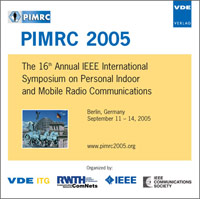Performance of Compensation Algorithms for Direct-Conversion Receivers under Finite Wordlength Constraints
Conference: PIMRC 2005 - 16th Annual IEEE International Symposium on Personal Indoor and Mobile Radio Communications
09/11/2005 - 09/14/2005 at Berlin, Germany
Proceedings: PIMRC 2005
Pages: 5Language: englishTyp: PDF
Personal VDE Members are entitled to a 10% discount on this title
Authors:
Weber, Rolf (Hella KGaA Hueck & Co., Rixbecker Str. 75, 59552 Lippstadt, Germany)
Jordan, Markus (Integrated Signal Processing Systems, RWTH Aachen University, Templergraben 55, 52056 Aachen, Germany)
Christoffers, Niels; Müller, Hans-Christian; Hosticka, Bedrich J. (Fraunhofer IMS, Finkenstr. 61, 47057 Duisburg, Germany)
Abstract:
Direct-conversion receivers have attracted increased attention recently as they represent an interesting architecture in portable wireless environments, where power, cost, and size are critical design constraints. They suffer, however, from various front-end impairments, with I/Q imbalance, DC offset, and flicker noise being among the most serious ones. Digital compensation algorithms have been proposed in the literature to cope with the adverse effects. Usually, these algorithms are analyzed by computer simulations in nearly infinitely precise arithmetic. A fixed-point finite wordlength implementation on DSPs, FPGAs, and ASICs typically results in a reduced performance. This paper investigates the performance degradation of various compensation algorithms due to a finite wordlength. The results obtained by bit-true simulations demonstrate that a moderate wordlength is sufficient to achieve results similar to infinite precision.


